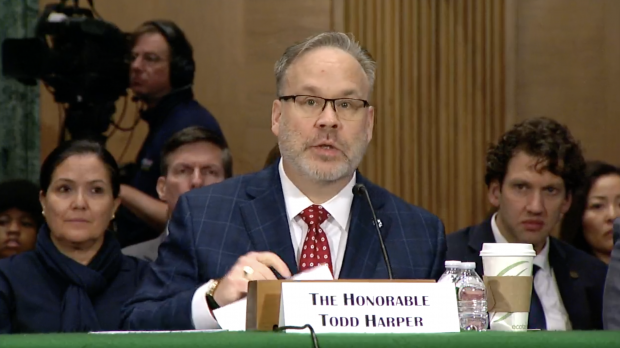 NCUA Chair Todd Harper testifying during a Senate Committee hearing on Tuesday, Nov. 14, 2023.
NCUA Chair Todd Harper testifying during a Senate Committee hearing on Tuesday, Nov. 14, 2023.
NCUA Board Chair Todd Harper, along with the other heads of U.S. financial regulators, appeared before the Senate Committee on Banking, Housing and Urban Affairs Tuesday morning for the annual briefing to lawmakers.
During the hearing, "Oversight of Financial Regulators: Protecting Main Street Not Wall Street," Harper sat with the leaders of Board of Governors of the Federal Reserve System, the Federal Deposit Insurance Corporation (FDIC) and the Office of the Comptroller of the Currency (OCC), who each gave updates on the state of the country's financial services regulators.
Recommended For You
In remarks filed with the Committee, Harper told members the credit union system has remained largely stable and resilient during the most recent economic disturbances. "However, during the last few quarters, the NCUA has seen growing signs of financial strain on credit union balance sheets and in household budgets. Economists are also forecasting an economic slowdown as the lagged effects of elevated interest rates take hold. Each of these developments could affect credit union performance in the coming quarters."
Harper also laid out three legislative requests and potential changes to the Federal Credit Union Act to better protect the Share Insurance Fund for Committee members to consider.
Central Liquidity Facility Reforms
Harper said the NCUA Board fully supports "a statutory change to restore the ability of corporate credit unions to serve as CLF agents on behalf of a subset of their member credit unions." Such legislation would better allow the CLF to serve as a shock absorber for liquidity events within the credit union system.
Earlier this year, legislation was introduced to allow corporate credit unions to purchase CLF capital stock on behalf of a subset of its members. "This legislation would permit corporate credit unions to contribute capital to provide coverage for smaller members with less than $250 million in assets. Liquidity risks within the credit union system are rising, and timely consideration of this bill would better protect the credit union system from future liquidity events."
Third-Party Vendor Authority
Raised numerous times during his tenure as NCUA Chair, Harper again raised the issue of receiving third-party vendor authority from Congress. Harper said he sees this as helping bring the NCUA up to the same regulatory authority level as other financial regulators.
"There has also been a shift in credit union leaders' understanding of the value of the NCUA having the same vendor authority as the federal banking agencies," Harper said. "The benefits include credit union access to NCUA examination information when conducting due diligence of vendors, fewer requests from the NCUA to credit unions to intervene with vendors experiencing problems, and fewer losses to the Share Insurance Fund."
More Flexibility for Administering the SIF
Harper addressed the collapse of banks earlier this year and the growing liquidity risks within the credit union system to ask Congress to give the NCUA additional flexibility in administering the Share Insurance Fund.
"Specifically, the NCUA requests amending the Federal Credit Union Act to remove the 1.50% ceiling for the Share Insurance Fund's equity ratio from the current statutory definition of 'normal operating level,' which limits the ability of the Board to establish a higher normal operating level for the Share Insurance Fund," Harper said. "A statutory change should also remove the limitations on assessing Share Insurance Fund premiums when the equity ratio of the Share Insurance Fund is greater than 1.30% and if the premium charged exceeds the amount necessary to restore the equity ratio to 1.30%."
Harper will face a similar group of politicians on Wednesday as he testifies in front of the House Financial Services Committee hearing titled "Oversight of Prudential Regulators."
© 2025 ALM Global, LLC, All Rights Reserved. Request academic re-use from www.copyright.com. All other uses, submit a request to [email protected]. For more information visit Asset & Logo Licensing.








